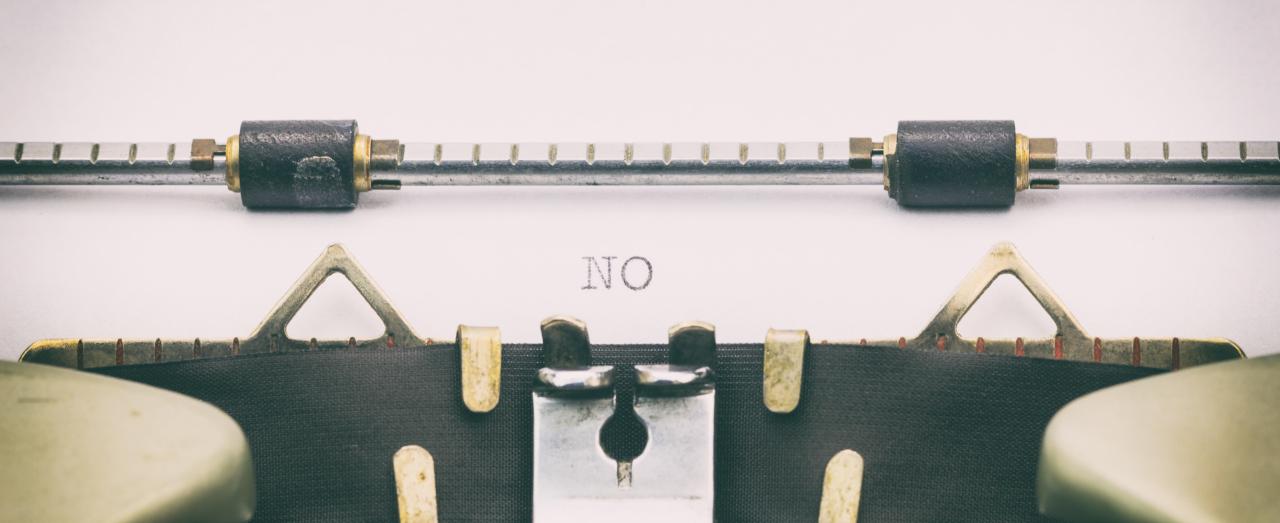The letter was polite but to the point. The PR firm where I’d applied for a job thanked me for my time but told me I hadn’t been successful. The position was going to someone else. Ouch.
This wasn’t the first time I’d been rejected, of course – and it certainly wasn’t the last. I’ve been dumped, ditched by friends and overlooked for work more times than I can remember. Who hasn’t? Not even the most successful among us is immune, as Sir Ian Rankin, 62, who has sold more than 20 million books, admitted last month. ‘I have had all kinds of projects turned down,’ he told the Write-Off with Francesca Steele podcast. ‘The rejections are abrupt. They are not at all apologetic, the buggers.’
Other high achievers to admit the sting of rejection include Walt Disney, fired from his job as a reporter for the Kansas City Star in 1919 for apparently lacking imagination and ideas, and Steven Spielberg, who was rejected three times from the University of Southern California School of Theater, Film and Television. J.K. Rowling was sacked from a secretarial role for ‘daydreaming’ – before her manuscript for Harry Potter was rejected by 12 publishers.
Humans have evolved to be sensitive to rejection, says Mark R. Leary, professor of psychology and neuroscience at Duke University: ‘When our prehistoric ancestors lived in small nomadic bands on the plains of Africa, being rejected from the clan would have been a death sentence.’ Yet rejection is no longer a matter of life or death – and in an age of social media, marrying later (if at all) and endless job-hopping, it’s unavoidable.
Sir Ian Rankin, who has sold more than 20 million books, admitted: ‘I have had all kinds of projects turned down. The rejections are abrupt and not at all apologetic’
Nonetheless, says Dipti Tait, psychotherapist and author of Planet Grief: ‘Rejection triggers an immediate reflex of self-doubt. Whether from a job or a relationship it can prompt us to start questioning our abilities, linking back to feelings of abandonment and of not being good enough.’
And it hurts – literally. Research measuring brain activity through MRI scans has found the same regions of the brain light up in people who have experienced rejection as in people experiencing physical pain. A 2010 study by the University of Kentucky showed that after taking painkillers, the brain scans of people who had experienced rejection showed lesser neural pain signalling, and they reported feeling better.
But before we reach for the Nurofen, we’d do well to remember that, while unpleasant, rejection can be a force for good. ‘We can’t stop this immediate (negative) reflex, but we can turn it into a positive,’ says Tait.
In relationships, being rejected shows we have dared to love – ‘Better to have loved and lost than never to have loved at all’, as the saying goes – while at work, it means we’re pursuing goals, and provided they’re the right goals, the more times we’re knocked back, the more we’re likely to eventually achieve them. As former basketball player Michael Jordan – cut from his high school team – said: ‘I have missed over 9,000 shots in my career… I have failed over and over and over again in my life. And that is why I succeed.’
Rejection can also be converted into motivation to stick a metaphorical two fingers up to doubters. In 2014, after researching 1,800 suggestions that were submitted through a company’s online suggestion box over 12 years, Dr Dirk Deichmann of Rotterdam School of Management found that those whose ideas had been rejected were more likely to return with a new idea than those whose ideas were immediately adopted (although there was a tipping point of 27 rejected ideas, at which stage people started to give up).
‘Rejection can prompt the rebellious part of your brain to prove yourself and try harder,’ says Tait. Something like this seems to have happened to Spurs striker and England captain Harry Kane – and his dad – after the player was ‘released’ from Arsenal’s academy aged just eight. ‘Rejection is a tricky thing when you’re a kid,’ Kane said in October to mark World Mental Health Day. ‘My dad was the one who told me. I wasn’t old enough to fully understand the feeling of rejection, and dad didn’t show any signs of disappointment. He just put his arm around me and said “We go again, and work even harder. Let’s see where it takes us”. And so we did.’
Of course, there are times the person doing the rejecting might have a point which, while infuriating, is an opportunity for growth. Vogue editor Anna Wintour has said that being sacked from her position as a junior fashion editor at Harper’s Bazaar was pivotal to her later success – ‘I recommend that you all get fired, it’s a great learning experience’ – while the late Apple CEO Steve jobs, sacked from his own company in 1985 before returning in 1997, said ‘getting fired from Apple was the best thing that could have ever happened to me. The heaviness of being successful was replaced by the lightness of being a beginner again… it freed me to enter one of my most creative periods’.
Rejection, Tait explains, ‘gives you time to reflect and can provide perspective and insight, showing you an alternative route you might not have considered before’.
Licking my wounds after being rejected from that PR job fresh out of university, I realised a career in public relations wasn’t for me and became a journalist – a line of work I’m better suited to. At the time the rejection hurt, but over time I’ve come to be grateful for it. Perhaps, painful as it is, Sir Ian Rankin was right when he described rejection as ‘good for the soul – it keeps you grounded, I think’.







Comments